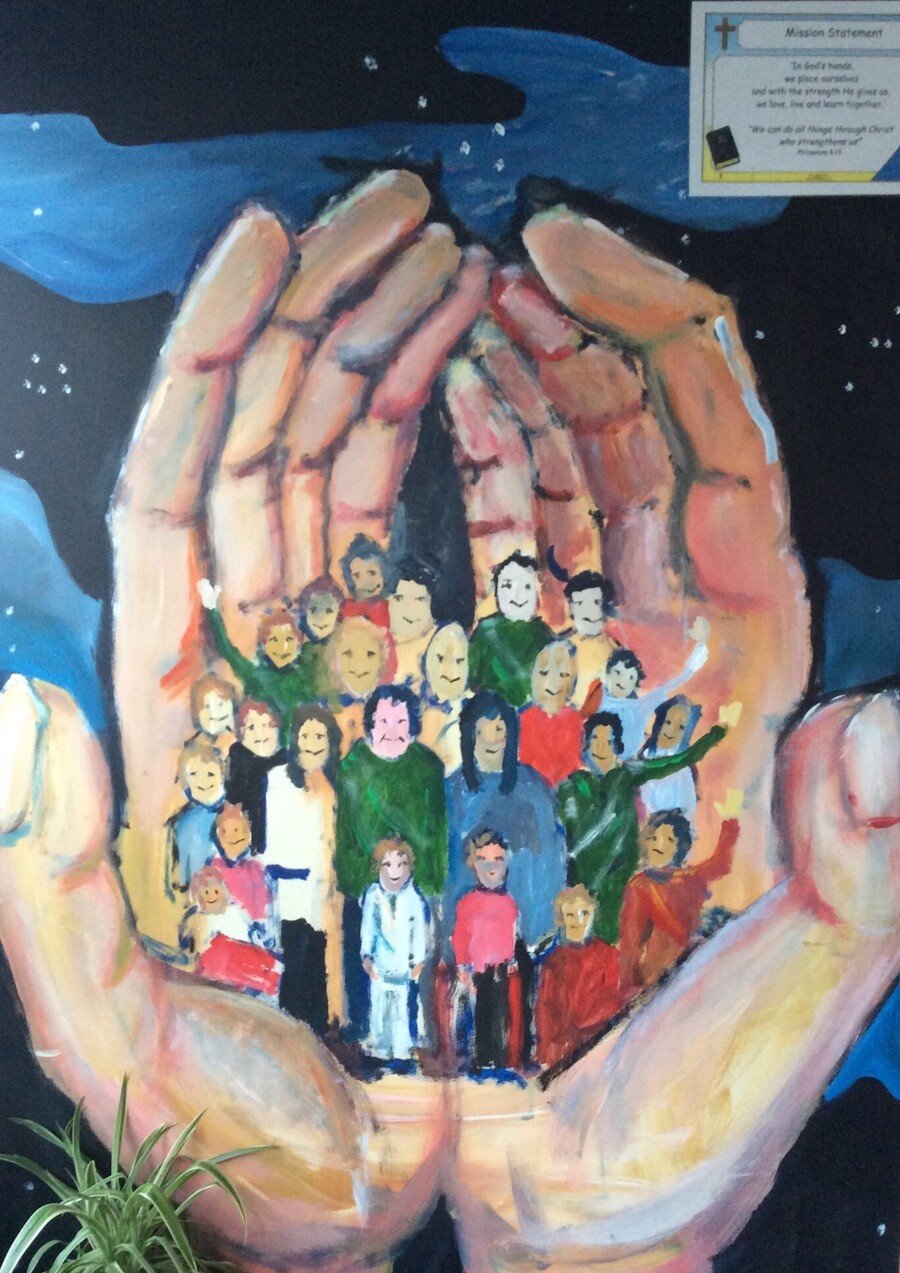RE
‘In God’s hands,
we place ourselves
and with the strength He gives us,
we love, live and learn together.’
“We can do all things through Christ
who strengthens us”.
Philippians 4:13
INTENT
Religious Education in our Church School is of the highest standard, reflecting the school’s distinctive Christian character.
All that is achieved in Religious Education is influenced by our mission statement. Our children are made aware, through sensitive teaching, of Christianity and the culture and religions of others. This broadens their understanding and does not confine them to a narrow and insular world.
Our Religious Education curriculum aims to-
- Provide pupils with knowledge and understanding of Christianity and other religions represented in Great Britain.
- Develop their understanding of the ways in which beliefs influence people in their behaviour, practices and outlook.
- Enable learners to apply the insights of the principal religious traditions to their own search for identity and significance.
- Facilitate learners’ individual journeys to developing their own beliefs and values and to have a positive attitude to the search for meaning and purpose in life.
- Encourage learners to develop a positive attitude towards other people who hold religious beliefs different from their own.
IMPLEMENTATION
The school has adopted the Blackburn Diocesan Religious Education Syllabus (Questful RE, 2022) which reflects the National Framework for RE. The majority of lesson time is devoted to Christianity whilst the remaining time is spent in studying Judaism, Islam and other major world faiths. R.E. is timetabled for one hour each week in Key Stage 1 and about an hour and a quarter in Key Stage 2.
However, RE is not solely confined to one weekly lesson. Rather, it permeates throughout the school with opportunities arising in other areas of the curriculum. For example, maths allows opportunities for real-life problem solving such as sharing and raising money. Further opportunities for Religious Education teaching are implemented through special religious festivals, such as Christmas, Easter, Sukkot, Diwali and Eid, and themed weeks such as Interfaith Week. In EYFS, as well as these further opportunities, children take part in Religious Education lessons which are interwoven through the early years curriculum.
RE is implemented through class, group and individual teaching methods with group discussions that allow teachers to consider the understanding of each child. Interactive, practical activities encourage the children to discuss their ideas and extend their understanding of difficult concepts and challenging questions. Learning is recorded both individually and in a class big book, with greater emphasis on big book work in Early Years and Key Stage 1.
IMPACT
The Questful Ladder of Expectation and Achievement is used for formative assessment at the end of each unit. Monitoring includes arrange of work sampling using both the class big books and work from a current unit, regular discussions with teachers, questioning children, assessment tasks and Governor discussions. Governors are updated termly about achievement in R.E. at both the Vision and Values committee and the Pupils, Standards and Effectiveness committee.
We put our R.E. teaching, and our Christian Values work into many practical and everyday practices. These include regular foodbank collections, retaining our national Fairachiever award (since 2012) and more recently, achieving the Christian Aid Global Neighbours award bronze level in October 2022. We carefully consider which visits and visitors to school will best meet the needs of our children and our curriculum.
The teaching of Fundamental British Values is woven throughout the teaching of R.E. For example, children are encouraged to work collaboratively and listen to and value other’s opinions and ideas (democracy). Children are taught that legal rights and responsibilities are core to the teachings of Jesus and religious leaders of other faiths (rule of law). Children are encouraged to express views or ideas freely, they are encouraged to express personal views when discussing sensitive or controversial issues and taught that individual liberties come with responsibilities (individual liberty). Children are given the opportunity to visit other Christian and non-Christian places of worship and meet those who worship there. They meet visitors from other faiths in school and are always encouraged to spend time reflecting upon such visits (tolerance and respect).
R.E., and our Christian Values, lie at the heart of our curriculum. Opportunities are sought to make links with R.E. and our school Christian Values in other areas of the curriculum. For example, Geography and History teaching incorporate opportunities for teaching about the acceptance of others in the world. Awe, wonder and stewardship of God’s world is explored during subjects including Science. Computing skills are used to present learning in a variety of ways. English and the study of stories from other cultures supports an understanding of the need for tolerance and understanding. Opportunities for personal reflection and spiritual development can be seen throughout the R.E. curriculum.
ENRICHMENT OPPORTUNITIES
There are many opportunities for pupils to get involved in ‘extra-curricular’ activities:
Each year, a representative from each class joins the Fairdo’s group to promote Fairtrade to the school and the community. R.E. ambassadors also represent each year group and meet regularly to plan, deliver and evaluate worships as well as lead on projects such as Toilet Twinning.
The choir have regular opportunities to perform in public, for example, at the village Duck Race in the summer of 2022, at our 125 years anniversary service in November 2022 and the Key Stage 2 Christmas Carol Concert. Pathfinders, an after school club, is a chance for children to look closely at Bible stories and discuss the relevance of them to their lives today.
Interfaith Week is marked each year during the autumn term which gives all year groups the chance to find out more about other faiths, often with visors being invited into school or visits for the children to take part in.
Finch Lane, Wigan, Lancashire WN6 9DT
01257 252647
bursar@appleybridgeallsaints.lancs.sch.uk














